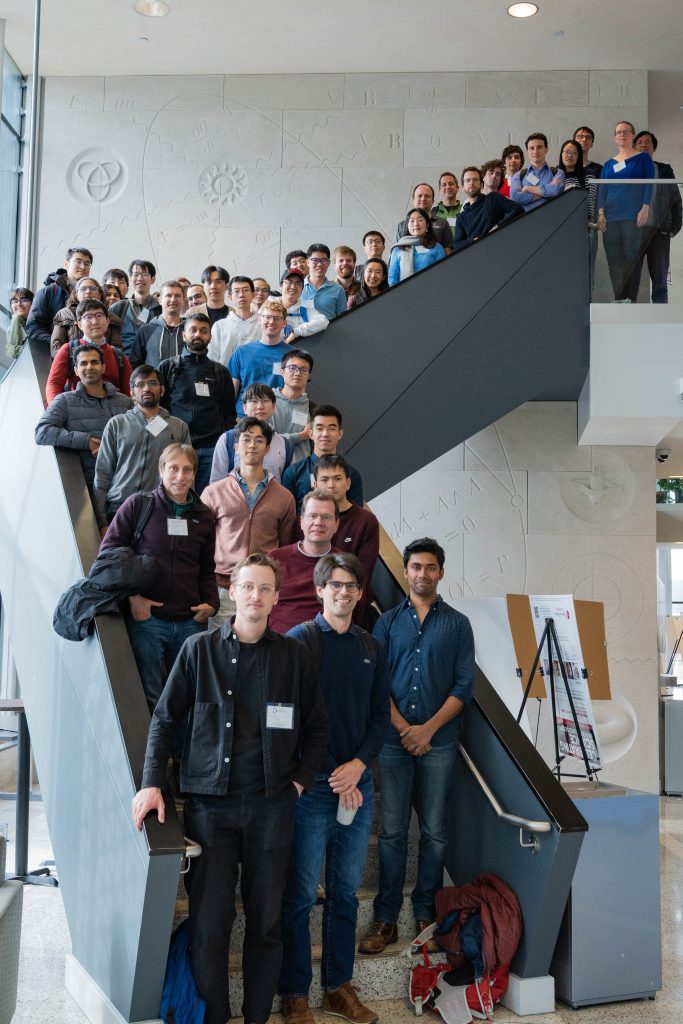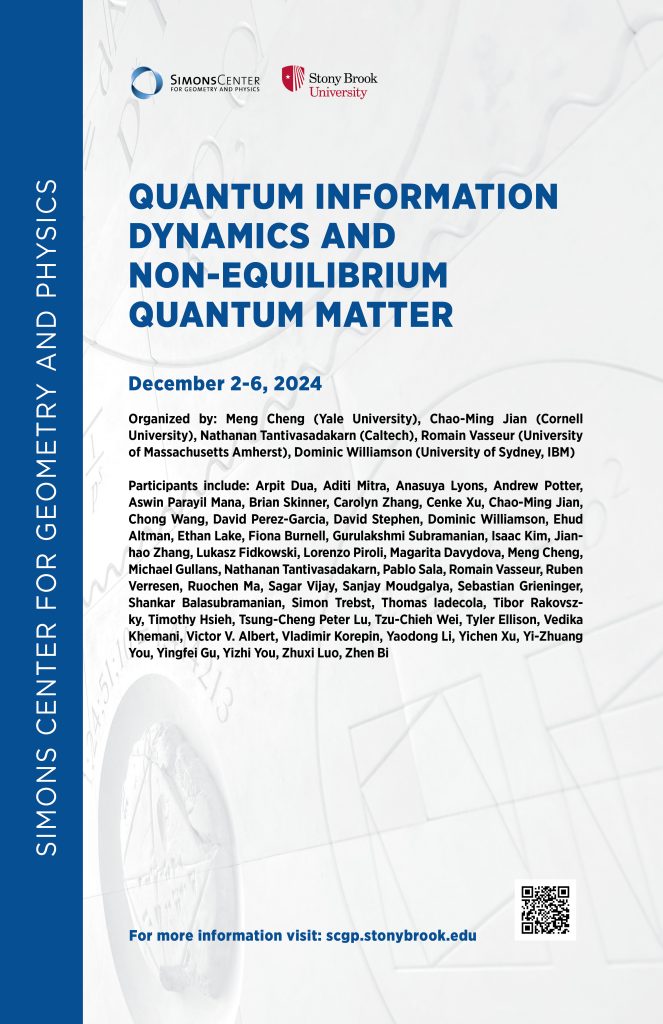ScheduleParticipant ListView Videos
Organized by:
- Meng Cheng (Yale University)
- Chao-Ming Jian (Cornell University)
- Nathanan Tantivasadakarn (Caltech)
- Romain Vasseur (University of Massachusetts Amherst)
- Dominic Williamson (University of Sydney and IBM)
The central goal of quantum matter research is to discover and decipher the universal collective behavior of quantum many-body systems, captured by the notion of quantum phases. A common and powerful strategy is to organize our understanding of collective quantum behavior following the general principles of symmetry and topology. This strategy has been tremendously successful, especially for systems in equilibrium. How the notion of quantum phases of matter should be generalized out of equilibrium remains a key open question. It is timely to pursue this direction as advances in highly tunable and controllable quantum devices have brought new opportunities in realizing and probing non-equilibrium many-body systems.
Interestingly, many recent works on dynamical quantum systems coupled to noise have found emergent phenomena that require not only novel generalizations of symmetry- and topology-based concepts but also the incorporation of many-body entanglement in the analysis. One example is given by topological quantum error-correcting code states prepared on a noisy device, where the concept of topological order needs to be generalized to non-thermal mixed states. Another prominent example is given by monitored quantum circuits with exotic dynamical phases that are differentiated by how quantum information spreads across the system. In light of these examples, there are tremendous opportunities to renew and extend our fundamental understanding of the organizing principles of quantum matter in non-equilibrium settings. Additionally, this direction has the potential to uncover new schemes to exploit non-equilibrium many-body entanglement for quantum information processing and better methods for quantum simulation in NISQ platforms.
With the proposed workshop, we aim to bring together the quantum matter and quantum information communities to foster the exchange of ideas in related directions and initiate new collaborations at the Simons Center for Geometry and Physics at Stony Brook University. Specifically, the proposed workshop will focus on (1) novel quantum phases in thermal and non-thermal mixed states, (2) universal behavior in quantum many-body entanglement dynamics, and (3) dynamical protocols for quantum matter and error correction.

Talk Schedule
| Time | Title | Speaker | Location |
| 8:30am | Breakfast | N/A | SCGP Cafe |
| 9:30am | Mixed State Quantum Phases and Markov Length | Timothy Hsieh | SCGP 102 |
| 10:00am | Mixed-state quantum phases: symmetry and anomaly | Chong Wang | SCGP 102 |
| 10:30am | Coffee Break | N/A | SCGP 102 |
| 11:00am | Realizing Non-Invertible Symmetries in Quantum Circuits by Twisted Gauging | Yi-Zhuang You | SCGP 102 |
| 11:30am | Symmetry TFT Perspective on Mixed State Phases | Zhen Bi | SCGP 102 |
| 12:00pm | Lunch | N/A | SCGP Cafe |
| 2:30pm | Universal model of Floquet operator Krylov space | Aditi Mitra | SCGP 102 |
| 3:00pm | Lieb-Robinson bounds with exponential-in-volume tails | Carolyn Zhang | SCGP 102 |
| 3:30pm | Tea Time | N/A | SCGP Cafe |
| Time | Title | Speaker | Location |
| 8:30am | Breakfast | N/A | SCGP Cafe |
| 9:30am | Decoherence and dissipation induced topological phenomenon in open quantum system | Yizhi You | SCGP 102 |
| 10:00am | Letting the tiger out of its cage: homological bosonic coding without concatenation | Victor Albert | SCGP 102 |
| 10:30am | Coffee Break | N/A | SCGP 102 |
| 11:00am | Spin glass order in classical and quantum LDPC codes | Vedika Khemani | SCGP 102 |
| 11:30am | Spin glass order in classical and quantum LDPC codes | Tibor Rakovszky | SCGP 102 |
| 12:00pm | Group Photo | N/A | SCGP Lobby |
| 12:00pm | Lunch | N/A | SCGP Cafe |
| 2:30pm | Monitored Kitaev models: Quantum circuits, entanglement dynamics, and synthetic fractionalization | Simon Trebst | SCGP 102 |
| 3:00pm | Concomitant Entanglement and Control Criticality Driven by Collective Measurements | Thomas Iadecola | SCGP 102 |
| 3:30pm | Tea Time | N/A | SCGP Cafe |
| Time | Title | Speaker | Location |
| 8:30am | Breakfast | N/A | SCGP Cafe |
| 9:30am | The “Choi-Spin Liquids” in Steady States | Cenke Xu | SCGP 102 |
| 10:00am | TBD | Ehud Altman | SCGP 102 |
| 10:30am | Coffee Break | N/A | SCGP 102 |
| 11:00am | Intrinsic mixed-state topological states from a symmetry perspective | Zhu-Xi Luo | SCGP 102 |
| 11:30am | TBD | Sagar Vijay | SCGP 102 |
| 12:00pm | Lunch | N/A | SCGP Cafe |
| 2:30pm | Universal measurement-based quantum computation in a one-dimensional architecture enabled by dual-unitary circuits | David Stephen | SCGP 102 |
| 3:00pm | TBD | Fiona Burnell | SCGP 102 |
| 3:30pm | Tea Time | N/A | SCGP Cafe |
| 4:00pm | Poster Sessions | N/A | SCGP 102/Lobby |
| 6:00pm | Banquet Dinner | N/A | SCGP Cafe |
| Time | Title | Speaker | Location |
| 8:30am | Breakfast | N/A | SCGP Cafe |
| 9:30am | Quantum topological order at nonzero temperature in three-dimensions | Tyler Ellison | SCGP 102 |
| 10:00am | Decohering Topological Order | Ruben Verresen | SCGP 102 |
| 10:30am | Coffee Break | N/A | SCGP 102 |
| 11:00am | Matrix Product Operator Algebras and their use to study topological order | David Perez-Garcia | SCGP 102 |
| 11:30am | Topological invariants for pure and mixed state phases | Isaac Kim | SCGP 102 |
| 12:00pm | Lunch | N/A | SCGP Cafe |
| 2:30pm | The measurement-induced phase transition on dynamical quantum trees | Brian Skinner | SCGP 102 |
| 3:00pm | Observable-sharpening transitions in monitored quantum circuits | Andrew Potter | SCGP 102 |
| 3:30pm | Tea Time | N/A | SCGP Cafe |
| Time | Title | Speaker | Location |
| 8:30am | Breakfast | N/A | SCGP Cafe |
| 9:30am | Quantum cellular automata and quantum phases of matter | Lukasz Fidkowski | SCGP 102 |
| 10:00am | Preparing many-body quantum states with quantum circuits and measurements | Lorenzo Piroli | SCGP 102 |
| 10:30am | Coffee Break | N/A | SCGP 102 |
| 11:00am | Dynamically generated concatenated codes and their phase diagrams | Michael Gullans | SCGP 102 |
| 11:30am | A local automaton for the 2D toric code | Shankar Balasubramanian | SCGP 102 |
| 12:00pm | Lunch | N/A | SCGP Cafe |
| 3:30pm | Tea Time | N/A | SCGP Cafe |


